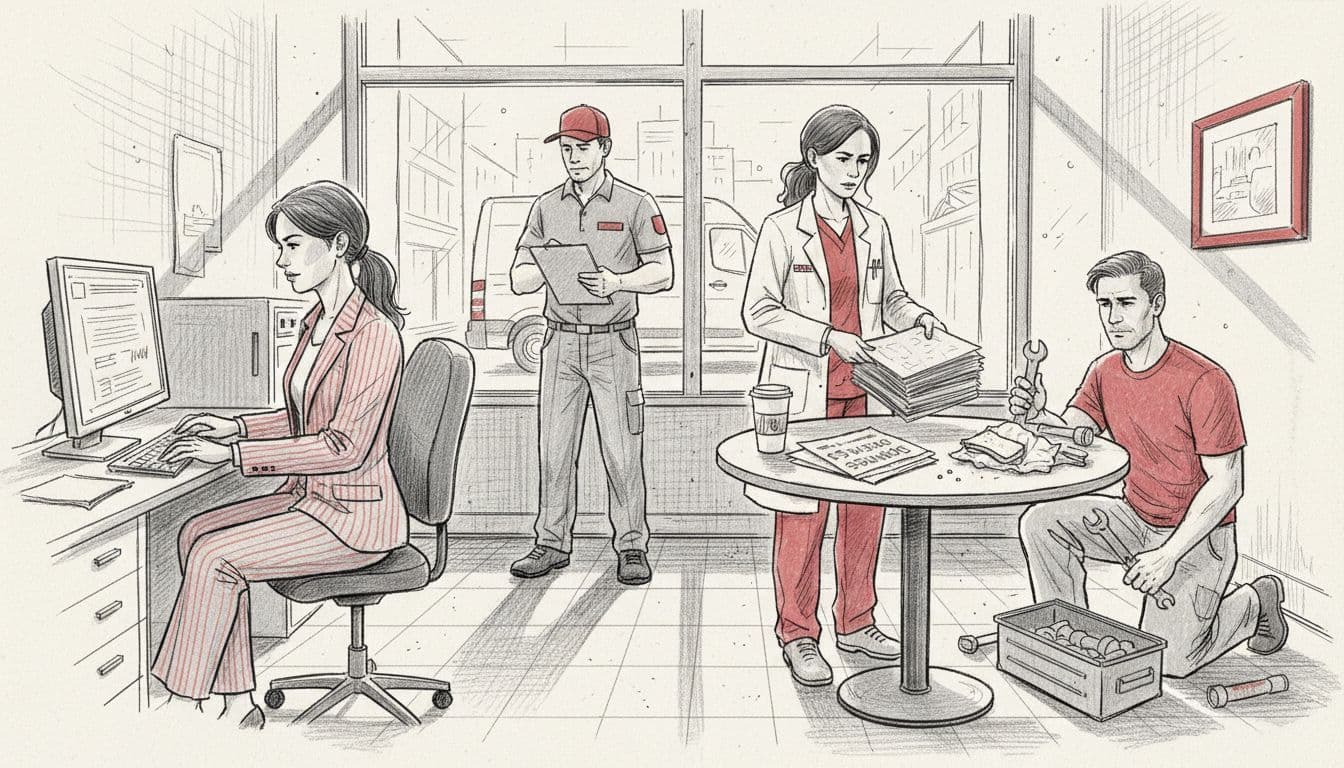The Evolution of Career Mentorship: Moving From 'What Do You Want to Be?' to 'Who Do You Want to Become?'
11.16.2024
Mentorship

Traditional career guidance often centers around one big question: "What do you want to be?" For decades, this question has served as a guiding light for countless mentorship conversations. But in today’s fast-paced world, where industries shift rapidly and new fields emerge overnight, the limitations of this approach are increasingly evident. It assumes that a career path is linear and straightforward, with each person fitting neatly into a predefined role. In reality, careers today are anything but straightforward.
The current professional landscape demands a shift in mentorship focus—from simply helping individuals match skills to roles, to nurturing a broader vision of what it means to grow professionally. People now seek careers that align with their personal values, lifestyles, and evolving identities. The question mentors should be asking is no longer "What do you want to be?" but "Who do you want to become?"
This modern mentorship approach considers the whole person, not just their job title. It acknowledges the impact of rapid technological advancements, the blending of remote and in-person work, and the rise of AI, which continually reshapes job expectations. Our thesis is simple yet profound: For mentorship to remain relevant, it must evolve to support individuals in developing their full potential—shaping not just their career paths but also their identities, adaptability, and resilience in the face of constant change.
Understanding the Modern Career Landscape
Key Patterns Across Professional Fields
In every industry, rapid technological change has created a new standard. The pace of innovation, particularly in fields like AI, data science, and software development, means that today’s in-demand skills can quickly become obsolete. Across professions, we see a growing need for continuous learning to remain competitive. Technical skills alone are no longer enough; soft skills like adaptability, communication, and collaboration are now just as vital for career success. This shift has prompted companies to look beyond technical competency, recognizing that problem-solving, empathy, and leadership are invaluable in driving sustained growth and success.
The modern workplace itself is evolving too. Many companies now embrace a mix of remote and in-person work environments, pushing professionals to excel in hybrid setups that blend virtual collaboration with face-to-face interactions. The increasing prevalence of remote work means that mentorship must also adapt, supporting mentees in developing skills suited to digital communication, self-management, and virtual networking. Flexibility and adaptability have become the new currency in the professional world.
The New Professional Reality
Traditional career paths followed a relatively predictable, linear trajectory. Today, the journey is often nonlinear, with professionals exploring multiple roles, industries, and even career shifts. This fluidity reflects a broader recognition that skills are transferable, and career growth often involves lateral or exploratory moves as much as upward mobility. For instance, someone may start in a technical role, later transition into management, or even pivot into a completely different field based on emerging interests or opportunities.
A critical component of this new landscape is work-life integration. Rather than striving for a rigid separation between work and personal life, professionals today are increasingly blending the two in ways that align with their values and overall life goals. Mentors need to consider the whole life context of their mentees, encouraging discussions about boundaries, well-being, and personal growth.
Finally, AI and automation continue to reshape the future of work. With routine tasks increasingly automated, professionals are now expected to focus on high-level strategic, creative, and relational work that machines cannot replicate. This shift underscores the importance of building a career around unique strengths and interests, rather than on tasks that may soon be automated.
Understanding these dynamics enables mentors to guide mentees in developing the skills and mindsets needed to thrive in this complex, evolving landscape.
Reframing Career Conversations
Moving Beyond Surface-Level Questions
Traditional career conversations often start with surface-level questions like “What job do you want?” or “Where do you see yourself in five years?” While well-intentioned, these questions fail to capture the complexities of today’s career landscape. They assume that people fit neatly into specific roles and that career success is as simple as choosing a title. In reality, however, the paths people follow are nuanced, shaped by values, passions, and personal goals as much as by industry demands.
The question “What do you want to be?” is becoming outdated. It places undue emphasis on predefined roles rather than on an individual’s growth potential, evolving interests, and unique identity. Today’s professionals aren’t just job seekers; they’re looking for purpose, flexibility, and the opportunity to make meaningful contributions. They need guidance that takes into account the whole person, not just a title.
Essential Questions for Modern Mentorship
To help mentees uncover their true goals, mentors should ask questions that go beyond job roles, exploring identity, values, and life aspirations. Here are some conversation starters:
Identity and Values
- “What energizes you in your daily work?”
- “Which problems do you feel compelled to solve?”
- “What does success look like to you beyond job titles?”
These questions help mentees identify the core motivations that drive their career aspirations. By understanding what truly excites them, mentors can guide them toward roles and industries that align with their unique strengths and values.
Lifestyle and Work Integration
- “How do you envision your ideal work-life integration?”
- “What role does work play in your broader life goals?”
- “Which work environments help you thrive?”
Lifestyle-related questions encourage mentees to think about how work fits into their life as a whole. For some, an intense focus on career growth may be important; for others, balancing family or personal interests is paramount. These reflections allow mentors to offer guidance that resonates with the mentee’s holistic goals and life context.
By reframing the conversation around values and lifestyle, mentors can help mentees build careers that not only meet professional aspirations but also nurture personal fulfillment. This approach fosters a deeper connection between mentors and mentees and provides a foundation for mentorship that supports both professional and personal growth.
Practical Frameworks for Modern Mentorship
The Career Evolution Framework
In guiding mentees, mentors need structured, adaptable frameworks to support their growth. The Career Evolution Framework is a holistic approach that considers both professional and personal dimensions of career development. It comprises four core components:
1. Technical Competency Development
The foundation of any career is technical skill. Mentors should encourage mentees to identify key skills needed in their fields and invest in continuous learning to stay relevant. This might involve formal education, certifications, or hands-on projects that push their abilities. Regularly assessing skill gaps and setting new learning goals will help mentees remain competitive.
2. Soft Skills Advancement
Soft skills—such as communication, empathy, resilience, and problem-solving—are essential for career progression. In modern workplaces, these skills enable professionals to work effectively across diverse teams and to navigate complex challenges. Mentors can provide practical exercises, such as role-playing scenarios or conflict-resolution exercises, to help mentees strengthen these skills.
3. Professional Network Building
Networking is invaluable for career growth. Mentors should guide mentees in building a supportive network within and outside their industry, emphasizing the importance of meaningful connections. Networking doesn’t only open doors to new opportunities; it also provides a broader perspective on industry trends and career options. Encouraging mentees to attend conferences, join professional groups, or seek out mentors themselves can help solidify their professional network.
4. Work-Life Integration Strategies
Effective career mentorship goes beyond professional skills to consider work-life integration. Mentors should encourage mentees to establish boundaries, prioritize self-care, and develop routines that support their overall well-being. This component emphasizes the importance of balancing career ambitions with personal health and relationships.
Implementation Guidelines
To make this framework actionable, mentors can set up regular check-ins to assess progress in each of these areas. Every quarter, mentors and mentees can review technical skills, evaluate personal goals, and make adjustments as necessary. By incorporating milestone setting, mentors can create a sense of accomplishment, helping mentees feel motivated and stay on track.
Given the pace of change in today’s industries, mentors should also discuss adaptation strategies with mentees. This includes encouraging a growth mindset, fostering curiosity, and practicing resilience in the face of setbacks. Building adaptability into career planning can empower mentees to handle changes more confidently and proactively.
Holistic Career Assessment Tool
A valuable addition to modern mentorship, the Holistic Career Assessment Tool explores mentees' motivations, preferences, and growth opportunities. This tool consists of key areas to explore in mentorship discussions:
1. Professional Identity and Values
This area focuses on core motivations and career values. Mentees can evaluate what they’re passionate about and where they see their skills making the most impact.
2. Skills and Competencies
Mentors and mentees can work together to assess technical and soft skills, identifying areas for development or refinement.
3. Work Environment Preferences
Understanding the type of environment where mentees thrive—whether it’s collaborative, remote, high-paced, or structured—can help mentors suggest fitting roles or organizations.
4. Growth Opportunities
This includes evaluating areas for career progression, skill advancement, and long-term potential within chosen fields.
5. Life Integration Goals
Discussing broader life goals allows mentees to envision how their career fits into their overall life plan, such as family priorities, health, or personal development.
Using the Assessment
Mentors can use this assessment as a conversation starter in each area, exploring mentees' values, strengths, and goals in-depth. Identifying patterns and themes across areas can reveal powerful insights about career direction, helping mentees craft action plans that reflect their true aspirations. Mentors can support them in setting realistic, achievable steps that align with their broader goals, allowing for consistent growth and fulfillment.
This comprehensive framework and assessment tool create a foundation for meaningful mentorship, enabling mentors to guide mentees through a journey of self-discovery, growth, and sustainable career development.
Common Themes Across Successful Careers
Universal Success Traits
While each career is unique, successful professionals often share common characteristics that help them thrive across industries and roles. Mentors can reinforce these traits to support mentees’ long-term success:
1. Strong Work Ethic
Commitment to excellence and a willingness to go the extra mile are hallmarks of career success. Mentors can guide mentees in developing habits that foster discipline, persistence, and focus, encouraging them to set high standards for their work.
2. Attention to Detail
Whether in technical fields, creative work, or client-facing roles, attention to detail ensures high-quality results. Mentors can help mentees build this skill by promoting self-check routines, constructive feedback, and a quality-over-speed approach to tasks.
3. Effective Communication Skills
Being able to clearly articulate ideas, actively listen, and adapt messaging to different audiences is essential. Communication is especially critical in today’s hybrid work environments, where digital communication is as common as face-to-face. Mentors should encourage mentees to practice active listening, empathy, and feedback, strengthening their ability to communicate effectively in diverse situations.
4. Continuous Learning Mindset
With rapid industry changes and evolving job demands, professionals must embrace a mindset of lifelong learning. By seeking out new skills, experiences, and knowledge, mentees remain adaptable and prepared for unexpected shifts. Mentors can support this by encouraging mentees to pursue courses, certifications, or hobbies that broaden their knowledge base and enhance their curiosity.
5. Professional Ethics and Integrity
Trust and integrity are foundational to any successful career. Professionals who act with honesty and uphold ethical standards are respected by peers, leaders, and clients. Mentors can model integrity and guide mentees in navigating ethical dilemmas, emphasizing that reputation is built over time through consistent, ethical actions.
Career Development Patterns
Careers unfold in stages, each presenting unique challenges and opportunities. By recognizing these patterns, mentors can tailor their guidance to help mentees navigate critical transitions.
1. Early Career Focus Areas
In the initial years, professionals typically focus on building foundational skills and industry knowledge. This stage is often characterized by trial and error, as mentees learn their strengths and identify areas of interest. Mentors can provide reassurance, helping mentees view challenges as learning opportunities rather than setbacks.
2. Mid-Career Specialization
At the mid-career point, many professionals choose to deepen their expertise or pivot to related fields. This is a prime opportunity for mentors to help mentees refine their skills, build their personal brand, and position themselves as experts in their niche. They can also encourage mentees to consider management or leadership roles if aligned with their goals.
3. Leadership Transition Points
For those interested in leadership, transitioning into managerial roles involves developing new skills—like team management, strategic thinking, and emotional intelligence. Mentors can guide mentees in navigating the complexities of leadership, such as handling conflict, inspiring teams, and making difficult decisions.
4. Adaptation to Industry Changes
As careers progress, industry disruptions or advancements often require professionals to adapt. Whether it’s a new technology, a change in market demand, or a shift in company direction, adaptability is crucial. Mentors can support mentees by discussing change-management strategies and helping them embrace new tools, methodologies, or roles that align with evolving industry trends.
Understanding these patterns allows mentors to offer targeted advice for each stage, helping mentees thrive by embracing traits and strategies that build a sustainable, successful career.
Practical Implementation Guide
Starting the Journey
The first steps in a mentorship relationship lay the foundation for impactful career guidance. Mentors can begin by establishing a clear framework for initial conversations, setting expectations and understanding the mentee’s goals and current challenges. By asking thoughtful questions, mentors can uncover what motivates their mentees, areas they’re struggling with, and how they envision their career in the short and long term.
A valuable tool for this stage is creating a development roadmap that outlines key milestones and skills to develop. For example, if a mentee is aiming to transition into a management role, the roadmap might include skill-building activities in leadership, communication, and team dynamics. This roadmap provides structure and direction, offering mentees a clear path forward.
Ongoing Development
To ensure consistent growth, mentors and mentees should engage in regular check-ins, ideally every month or quarter, to review progress and make adjustments. These check-ins help maintain momentum, offering a chance to reflect on what’s working and what needs re-evaluation. Mentors can use these meetings to provide feedback, celebrate milestones, and revisit the mentee’s evolving goals.
Progress tracking methods, such as journaling or maintaining a professional development portfolio, allow mentees to see how far they’ve come and identify areas for improvement. As the industry or their interests change, mentors should also guide them in adaptation strategies, encouraging flexibility and resilience. Together, they can adjust the roadmap as new opportunities, technologies, or interests arise, ensuring that the mentee’s career path remains aligned with their personal growth and professional ambitions.
Learn How to Take Your Mentorship to the Next Level
The professional landscape is constantly shifting — whether you work in cybersecurity, physiotherapy, or law, there’s a constant stream of new entrants into your industry. To match these changing needs, your mentorship strategy must grow beyond traditional questions of "What do you want to be?" to address "Who do you want to become?"
By shifting the focus to holistic development, mentors can support mentees in building careers that are resilient, adaptable, and deeply fulfilling. Emphasizing identity, values, skills, and life integration allows for more meaningful career journeys. As industries and roles continue to change, mentors play a vital role in helping professionals navigate these shifts with confidence and purpose. To all mentors: let’s champion a new era of mentorship that empowers the whole person.
Subscribe to My Career Shop Content
Stay up to date with Blog Posts and Podcast Episodes!
Your One Stop Shop For All Career Resources
Whether you are exploring new career paths, building your resume, or preparing for your next opportunity, our tools, templates, and guidance are designed to help you navigate your career journey with clarity and confidence.
Copyright © 2025 My Career Shop. All rights reserved.





























